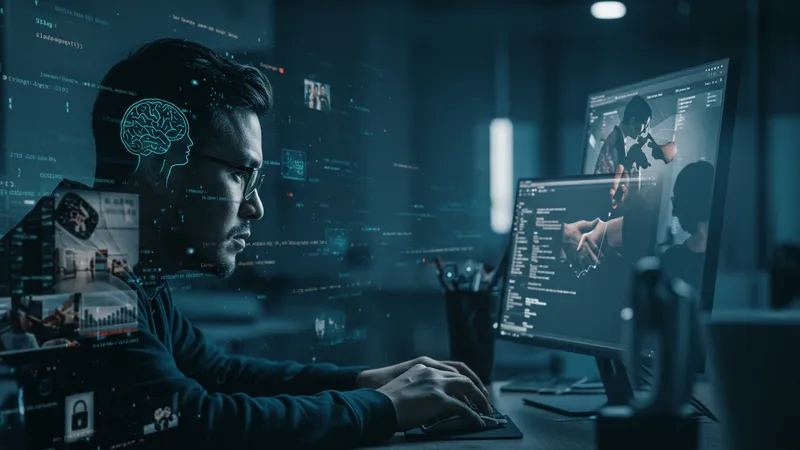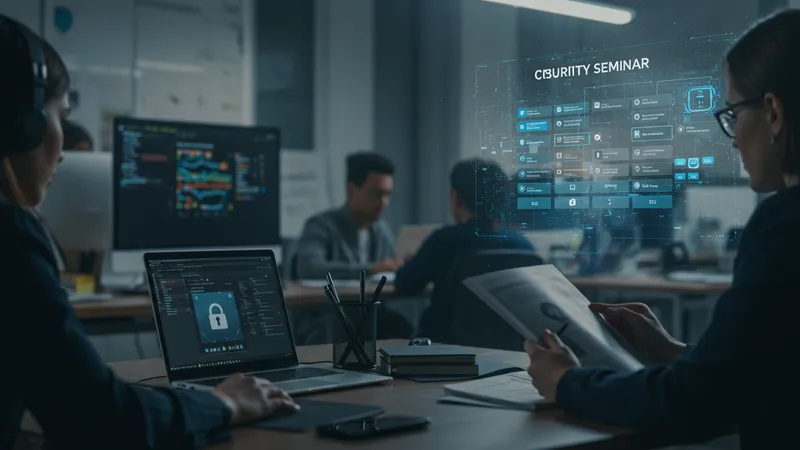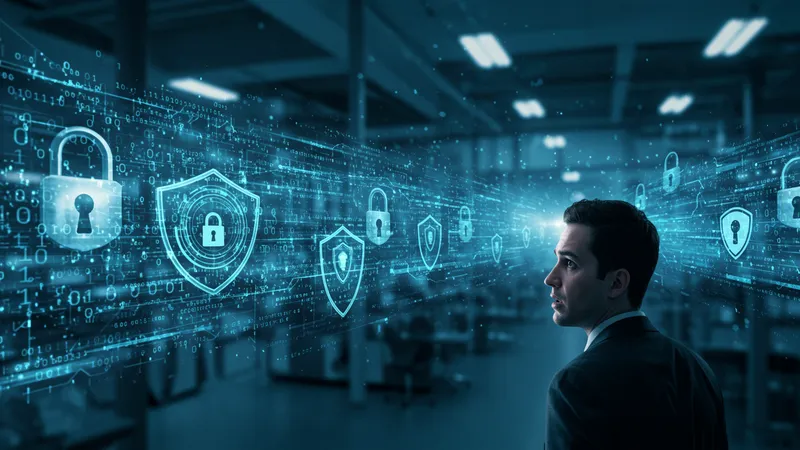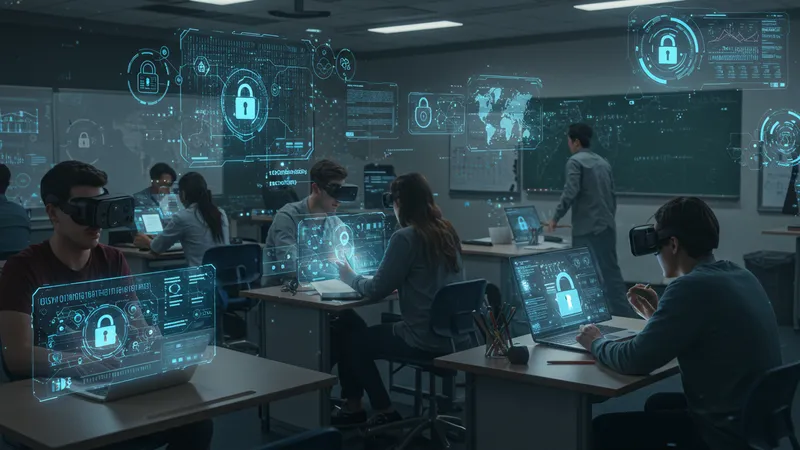

Imagine a world where cybersecurity jobs go unfilled. A bold claim, right? But it’s a reality as tech evolves faster than we can secure it. The cybersecurity curriculum is not just an educational trend, it is a global necessity.
With cyber attacks growing exponentially, the urgency to train the next generation of cyber defenders has never been more pressing. Understanding cybersecurity pathways can open lucrative doors and shape the future of digital safety. Don’t overlook these hidden truths before it’s too late.
While most people believe cybersecurity is only about coding or being a tech genius, the reality is starkly different. Soft skills like communication and problem-solving are just as valuable. Employers seek these attributes in combination with technical knowledge. But that’s not even the wildest part…
Many believe a degree is the only route to a cybersecurity career, but this couldn’t be further from the truth. Bootcamps and independent certifications often provide more up-to-date, practical skills than traditional degrees. And the cost-effectiveness of these options might surprise you. But there’s more to uncover…
Are career pathways in cybersecurity as clear-cut as the guides suggest? Or are there secrets that could redefine conventional wisdom? What happens next shocked even the experts…
It's a common misconception that entry-level cybersecurity roles are easy to access, requiring minimal training. In reality, these positions often demand a strong foundation, encompassing everything from risk management to ethical hacking. The demand for skills can be overwhelming and the competition fierce. But for those in the know, the path is clearer than it seems because it’s not just about technical prowess, it's also about strategic thinking and adaptability. But there's one more twist…

A significant insider tip is the importance of networking within the cybersecurity community. Many roles are filled by referrals rather than through job postings. Building genuine relationships with industry professionals can provide intel on unadvertised opportunities. So, if you think you're doing everything you can by just applying online, you might want to reconsider your strategy. What you read next might change how you see this forever.
Moreover, the perception that certifications are mere formalities is misleading. Each certification not only validates a specific skill set but often distinguishes candidates who continuously pursue learning. The continuous evolution of threats requires professionals who can rapidly adapt and evolve their skill sets. But what does this mean for your career prospects if you're just getting started?
Landing your first job can seem daunting with so many skills to juggle. But targeting internships and traineeships can be a powerful way to break into the industry. These opportunities offer valuable hands-on experience and can sometimes lead to full-time roles. However, this stepping stone approach requires patience and persistence, testing your determination in an environment where experience is your greatest currency. So, how do you keep pace with the demand?
In cybersecurity, honing technical skills is essential, but there's a hidden layer of competencies that could make or break a career. Many overlook emotional intelligence and problem-solving capabilities, yet these are key components in swiftly identifying and mitigating threats. A technical expert who struggles to communicate risks will struggle to convey urgency to stakeholders. The balance of hard and soft skills is what truly sets apart the standout professionals. But what do these hidden competencies truly entail?

Strategic elective courses may offer invaluable insights. Taking classes outside of traditional technical scope—such as psychology or conflict resolution—can arm you with unique perspectives. Understanding human behavior can be as critical in anticipating threats as knowing code. After all, many cyber threats stem from understanding and exploiting human nature, not just technical vulnerabilities. But there's an even broader narrative to grasp…
Additionally, cybersecurity roles often require a strong ethical grounding. Understanding the implications of one's work on privacy and societal norms can't be disregarded. Those possessing a deep understanding of ethics are trusted to make decisions that shape the integrity of their field. Often, ethical dilemmas are the ultimate test of character in cybersecurity. But how does one prepare for such challenges before they arise?
Seemingly small choices in extracurriculars or projects can give you a big edge. Engaging with case studies or role-playing exercises in real-world scenarios can prepare individuals to navigate ambiguous situations with clarity. Yet, as you adapt, the industry keeps evolving. What’s the future of cybersecurity, really?
Staying at the cutting edge in cybersecurity is costly, both financially and mentally. While businesses invest billions into new technologies annually, keeping personal skills up-to-date can be equally demanding for individuals. Continuous education through courses, seminars, and certifications becomes a lifelong commitment. But there’s a hidden benefit to this relentless quest for knowledge...

One often underestimated resource is employer-funded professional development programs. Many companies offer substantial incentives for employees to expand their skills, from paid courses to attending industry conferences. For those willing to pursue opportunities within their current organizations, the path to staying current could be less costly than anticipated. Yet, the challenge remains—knowing which skill will be important next.
A proactive approach to learning also involves keeping an ear to the ground for emerging trends. Fields like artificial intelligence, quantum computing, and IoT security are rapidly advancing, presenting both opportunities and new threats. Being a step ahead requires you to not only understand these technologies but to predict their future implications in cybersecurity. Are you equipped to meet these futuristic demands?
The mental toll of constant learning is not often discussed. Cybersecurity professionals face significant stress, not from threats alone, but from the relentless pace of innovation. Balancing this with a healthy work-life ethos is crucial to avoid burnout. But what's the key to maintaining that balance while staying competitive?
The nature of cyber threats is constantly shifting, evolving into more sophisticated forms every year. What used to be straightforward challenges like virus removal now includes battling against complex malware, ransomware, and increasingly, AI-driven attacks. Cybersecurity professionals must anticipate these advancements to preemptively guard against them. But the pace of evolution isn't the only surprising factor...

Behind these threats is an equally rapid evolution of adversaries. Today’s cybercriminals are no longer lone hackers; they are organized groups, often state-sponsored, and driven by geopolitical motives. A well-trained cybersecurity team must understand these dynamics to mount an effective defense. But how can an individual cybersecurity professional adapt to this complex world of cyber warfare?
Establishing a 'threat intelligence' mindset is crucial. This involves tracking the digital footprints of potential threats and staying informed through channels like industry reports and security forums. Proactively learning how attacks unfold can significantly enhance one’s defensive strategies. But beyond familiar threats, are there surprises still lurking in the dark web?
Networking with peers across different sectors can reveal threats from industries one might not traditionally consider. Understanding how a threat in one area can cascade into another is invaluable. Preparing for what lies beyond the horizon in cybersecurity can shape the future success of professionals in this field. What’s the real secret to staying ahead?
While the gender gap in tech is widely acknowledged, its impact within cybersecurity is particularly pronounced. Only 24% of the cybersecurity workforce is female, highlighting a substantial imbalance that affects team dynamics and innovation. The presence of women in cybersecurity can enrich the field with diverse perspectives and approaches. However, the road to inclusivity is lined with challenges...
The industry’s inherent biases can deter women's participation from the start. Cultural stereotypes and the misbelief that cybersecurity is a male-dominated domain are still prevalent. Yet, women like Theresa Payton, former White House CIO, demonstrate the profound impact they can have in top security roles. But how can the industry better support women on this journey?
Initiatives like mentorship programs and women-focused cybersecurity networks have started gaining traction, providing essential support and networking opportunities. These initiatives empower women to step confidently into cybersecurity careers, develop leadership skills, and challenge existing norms. How effective are these movements in reshaping the field entirely?
The need for inclusivity goes beyond sheer numbers—it’s about creating environments where diverse talent can thrive. Companies prioritizing inclusivity often enjoy higher innovation and performance, illustrating the tangible value of a diverse workforce. But how can individuals champion these changes from within?
When thinking about careers in cybersecurity, most envisage roles such as security analysts or penetration testers. Yet, beneath the surface are a multitude of unexpected job roles that are equally indispensable. Roles like 'malware analyst,' 'cryptanalyst,' or 'cyber deception planner' might not immediately come to mind, but they are essential to a rounded security strategy. So why are these roles often hidden from view?

Part of the obscurity stems from how cybersecurity careers are traditionally marketed—largely via technical roles. Yet, these unexpected positions often employ creative thinking, merging tech-savvy skills with innovative strategic approaches. This broader range ensures comprehensive defenses by covering every possible attack vector. Are you prepared to explore these less-discussed paths?
To enter such specialized fields, tapping into niche networks and forums is invaluable. Connecting with role-specific professionals can provide insight into daily responsibilities and career growth potential. Finding guidance from experts already in these roles could catalyze your entrance into this less-trodden path. Could this be your hidden opportunity away from mainstream competition?
The dynamic nature of these roles often demands lateral transition capabilities. Professionals frequently move across roles as emerging threats and technologies create new niches. This fluid movement maintains relevance and injects excitement into their careers. What does this mean for sustaining a fulfilling career in cybersecurity?
Cybersecurity is often associated with protecting large corporations, yet small businesses face equally, if not more, significant threats. Large firms have the resources to establish robust defenses, while SMEs often lack the budget and expertise, making them enticing targets. So why do small businesses often undervalue cybersecurity?

A common myth is that small businesses don’t hold enough valuable data to warrant serious attacks. However, they often hold crucial client information that can be devastating if compromised. This misperception leaves them vulnerable and often unprepared for sophisticated attacks. How do small enterprises bridge this critical knowledge gap?
Small businesses can mitigate risks by implementing basic cybersecurity measures. Practices such as regular software updates, secure data backups, and employee training on phishing attacks can prevent the majority of potential breaches. For those seeking cost-effective solutions, collaboration with cybersecurity startups offering SME-focused packages can be valuable. Is your small business equipped to deal with these rising digital threats?
Raising cybersecurity awareness and providing comprehensive training to all employees is equally vital. Many successful attacks begin with a single unaware individual clicking on the wrong link. Creating a culture that champions cybersecurity awareness at every level can be the key to survival and success. Are you fostering the right culture within your organization?
Beyond economic damage, cyber attacks can have profound psychological impacts. Companies and individuals suffer anxiety, distrust, and at times, reputational harm following breaches. The mental toll from dealing with potential data loss can overshadow even financial concerns. Yet, these effects are often under-discussed. So, what are the real psychological impacts of these digital threats?

Cyber attacks are akin to home invasions, violating personal space and safety. Victims might experience insomnia, stress, or paranoia about further attacks, affecting their personal and professional lives. The relief of ‘patching the breach’ is often clouded by lingering fears over data misuse. How can affected entities reconcile with these aftermaths?
Actions that help mitigate psychological fallout include transparent communication and drawing on psychological counseling services if necessary. Acknowledging the impact and working towards emotional recovery can expedite organizational healing. What parallels can be drawn between psychological recovery from cybercrime and physical crime recovery?
Organizations should also foster environments where discussing attacks becomes a space for growth rather than blame. By implementing lessons learned and reinforcing communal defense against future threats, the path to recovery becomes collaborative. What role does resilience play in overcoming cyber trauma?
Ethical hacking might evoke images of secretive coders navigating systems under cover. Yet, today's ethical hackers are vital strategic assets, legally probing systems to identify vulnerabilities before malicious actors do. Society tends to misunderstand hacking, perceiving it as inherently immoral. But ethical hacking's value stretches far beyond rogue stereotypes...

Standing at the intersection of legality and technical prowess, ethical hackers provide insights no testing tool can. Their creative approaches mimic how attackers might think, offering invaluable insights into potential breaches. As cyber threats grow more complex, these ethical hackers are central to developing preemptive strategies. Are you leveraging ethical hacking to its full potential?
Organizations employ firms specializing in ethical hacking, ensuring their systems undergo rigorous, real-world testing. This proactive approach fortifies defenses while simultaneously debunking the ‘bad guy’ myth often attributed to hacking. As industries grow increasingly reliant on tech, what role will ethical hackers play in shaping digital futures?
Harnessing ethical hacking goes beyond merely hiring talent; it involves integrating ethical principles within tech education systems to nurture responsible hackers. Encouraging innovation while instilling ethical standards reshapes how upcoming generations perceive and conduct hacking activities. How can current approaches evolve to maintain ethical standards amid rapid tech changes?
AI is revolutionizing the cybersecurity landscape, with algorithms sifting through vast datasets to detect anomalies and potential threats faster than humanly possible. As AI becomes vigilant watchdogs in the digital sphere, both opportunities and uncertainties arise from this tech evolution. So, what are the advantages and pitfalls of AI in cybersecurity?

AI-driven systems can operate continuously, providing instant analysis and responses to threats. This dramatically improves response times, offering real-time protection against rapidly evolving cyber threats. But AI systems bring their own challenges, including the risks of over-reliance and potential blind spots in algorithms. How can cybersecurity professionals leverage these systems effectively?
As AI adapts, so too do cybercriminals, accentuating a perpetual cat-and-mouse dynamic. Threat actors are employing AI techniques to enhance their attacks, creating tools that learn and adapt from failed attempts. This AI arms race requires cybersecurity experts to adopt AI not just as a tool, but as a fundamental component of their strategy. So, how does one stay ahead in this AI-centric era?
The ethical considerations of AI in cybersecurity are profound. Decisions made by AI can be opaque, creating ethical dilemmas regarding transparency and accountability in security decisions. This demands a balanced approach, leveraging AI's power while ensuring human oversight. What you read next might change how you see artificial intelligence applications forever...
As technology progresses, so must the frameworks used to educate future cybersecurity professionals. Traditional educational institutions are grappling with how to adapt curriculums that stay relevant amid rapid technological advancements. The question isn't merely about what we teach, but how we prepare students for an unpredictable future. So, where is cybersecurity education heading?

Integrating holistic approaches—combining technical acumen with behavioral sciences and ethical considerations—is forging a new era in cybersecurity education. By expanding the educational lens, students gain a broader understanding, equipping them to tackle multifaceted cyber challenges. But can this model keep pace with evolving threats?
Continuous collaboration between academia and industry helps close the skill gap, ensuring that curriculums remain anchored in real-world applications. This partnership leads to internships and real-world projects that bridge theoretical learning with practical skill development. How does this dual-focused approach benefit both students and employers?
Moreover, the advent of virtual educational platforms and cybersecurity bootcamps mitigates geographical and financial barriers, offering more people access to quality security education. This shift democratizes learning opportunities, paving the way for a diverse new generation of cyber defenders. How can ongoing innovation in educational practices further shape cyber expertise?
The digital realm is ever-expanding, and cybersecurity's role grows more critical with each new development. The lessons each page reveals underscore the urgency of strategic thinking and adaptable learning in this field. As you've explored the many facets and futures of cybersecurity, you've seen that this is more than a career path—it's a commitment to a secure future.
Your journey through these pages reflects a glimmer of the potential on your horizon. If you've found insight and intrigue here, why keep it to yourself? Share these revelations, bookmark this source of knowledge, and step boldly into the digital frontier. Your future—and the security of many—may depend on it.